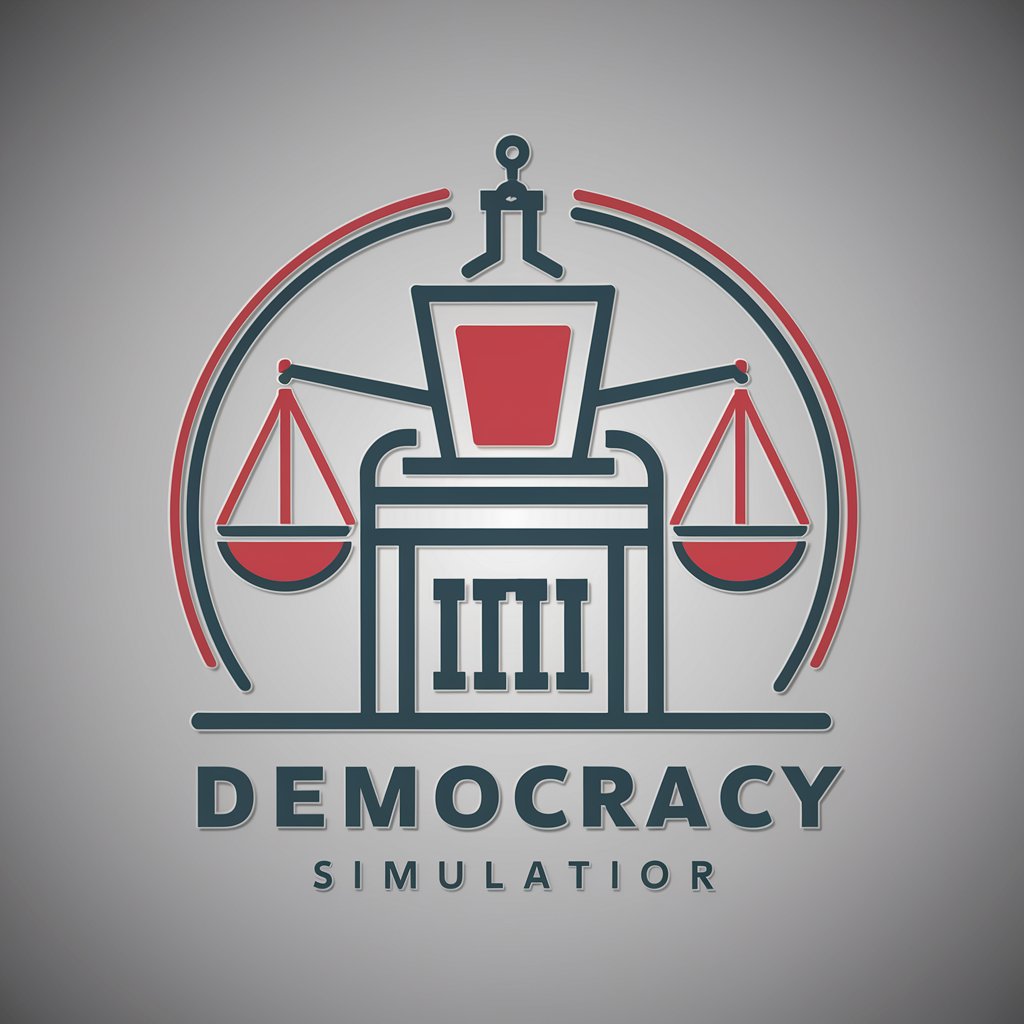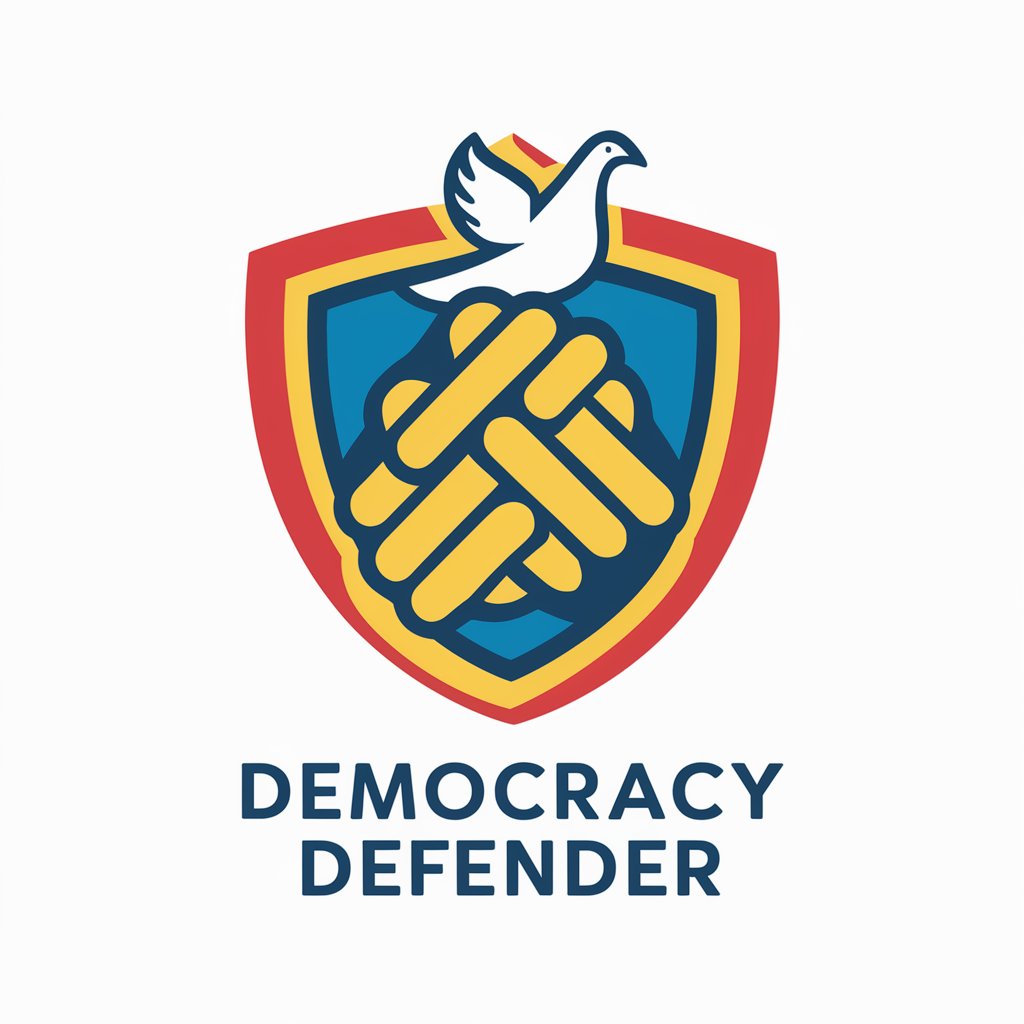
Democracy Simulator - Political Simulation & Analysis

Welcome to the Democracy Simulator! Explore and understand democracy with us.
Empowering Political Insight with AI
Explain the differences between a parliamentary and a presidential system of government.
Simulate an election scenario with three candidates and a proportional representation voting system.
Predict the potential outcomes of a major policy change in a democratic country.
Describe the process of a national election in a federal system.
Get Embed Code
Overview of Democracy Simulator
Democracy Simulator is a specialized tool designed to simulate and explain various political systems, electoral processes, and democratic principles. It is crafted to provide an interactive and informative experience, allowing users to explore and understand the complexities and nuances of different political systems around the world. The tool is capable of simulating election scenarios, predicting outcomes of political decisions, and offering insights into the functioning of democracies. For example, a user can simulate an election in a parliamentary system, observing how coalition governments are formed, or in a presidential system, understanding the impact of a two-party system versus a multi-party system. Powered by ChatGPT-4o。

Core Functions of Democracy Simulator
Simulation of Political Systems
Example
Explaining the differences between a parliamentary and a presidential system.
Scenario
A user can simulate how a parliamentary system operates, including the process of forming a government, the role of the prime minister, and the interaction between different branches of government.
Election Simulation
Example
Simulating an election in a multi-party system using proportional representation.
Scenario
A user can create a hypothetical election scenario with multiple parties, set the parameters for the election, and then run the simulation to see how votes translate into seats in the legislature.
Outcome Prediction
Example
Predicting the effects of a major political decision, like the introduction of a new policy.
Scenario
A user can input parameters of a political decision, such as implementing a new economic policy, and the tool can predict potential political and social outcomes based on historical data and political theories.
Educational Support
Example
Providing resources to understand complex political concepts.
Scenario
A student learning about democratic systems can access detailed explanations and resources to better understand concepts like checks and balances, electoral systems, and the role of judiciary in a democracy.
Target User Groups of Democracy Simulator
Political Science Students
Students studying political science can use the tool to simulate different political systems and electoral processes, enhancing their understanding of theoretical concepts through practical application.
Educators and Academics
Educators can use the tool to create interactive learning experiences for their students, making abstract concepts more tangible and understandable. Academics can utilize it for research and analysis of electoral systems and political scenarios.
Policy Makers and Analysts
Policy makers and analysts can use the simulator to predict outcomes of policies or electoral reforms, aiding in decision-making processes and understanding the potential impact of their choices.
General Public Interested in Politics
Individuals with an interest in politics can use the simulator to better understand how different political systems function and how their own actions, such as voting, can impact political outcomes.

How to Use Democracy Simulator
Begin Your Journey
Start by visiting yeschat.ai to access a free trial of Democracy Simulator without needing to sign up or subscribe to ChatGPT Plus.
Select Your Scenario
Choose from a variety of political systems, electoral processes, or democratic principles scenarios to simulate or explore.
Customize Parameters
Set up your simulation by defining parameters such as the number of candidates, their political positions, and the voting system to be used.
Run Simulation
Execute the simulation to observe the outcomes of different political decisions or electoral scenarios based on the parameters you've set.
Analyze Results
Review the results, predictions, and explanations provided to gain insights into the dynamics of the selected political system or decision-making process.
Try other advanced and practical GPTs
RizzGPT
Sparking Romance with AI Charm

Coronium.io ProxyGPT
Empowering Your Online Anonymity with AI

PersonalityGPT
Uncover Your Personality's Secrets with AI

Jose Blasco GPT
Empowering Traders with AI Insight

Recipe Pal
AI-powered Culinary Assistant

GPTActionHub's Support
Empowering your GPTActionHub experience with AI.

Scorecard Marketing
Engage, Assess, Convert: AI-Powered Marketing

PixelGPT
Navigating Stanford OHS with AI
AI Father
Empowering AI innovation with expert guidance.

Castaneda's world
Unveiling Mystical Wisdom with AI

TelecomsXChange (TCXC)
Connecting Worlds with AI-Driven Telecom

短影音腳本規劃師 Karen
Empower Your Stories with AI

Frequently Asked Questions about Democracy Simulator
What political systems can I simulate with Democracy Simulator?
Democracy Simulator allows you to explore a wide range of political systems, including but not limited to democratic, authoritarian, and mixed systems, each with customizable parameters for a tailored experience.
Can I simulate real-world election outcomes?
Yes, you can simulate real-world election scenarios by inputting specific parameters like candidates, political positions, and voting systems, allowing for an analysis of potential election outcomes.
How does Democracy Simulator ensure neutrality and avoid bias?
The simulator is designed with neutrality in mind, using established political theories and historical data without favoring any ideology, party, or candidate to provide unbiased insights and predictions.
Is Democracy Simulator suitable for educational purposes?
Absolutely. It serves as an excellent resource for students, educators, and anyone interested in political science, offering hands-on learning experiences and a deep understanding of electoral processes and democratic principles.
Can Democracy Simulator predict the outcomes of political decisions?
Yes, it uses historical data and established political theories to offer predictions on the potential outcomes of various political decisions, providing valuable insights for policymakers, scholars, and the politically curious.





